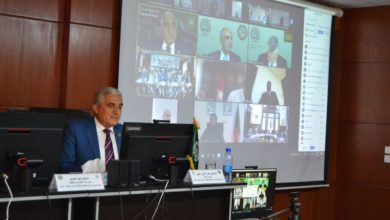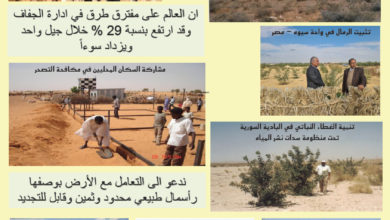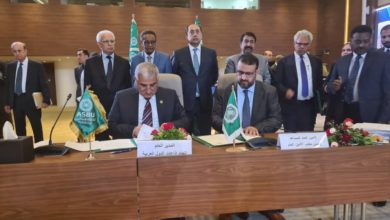ACSAD organization holds a training workshop on artificial insemination of Small ruminants in Lebanon.
Today, at the headquarters of the Agricultural Scientific Research Department in the town of Terbol, Bekaa, in Lebanon, the practical scientific activities of the training workshop on “artificial insemination in small ruminants,” organized by the Arab Center for the Studies of Arid Zones and Drylands (ACSAD) for the benefit of 20 veterinarians and agricultural engineers from the cadres of the Lebanese Ministry of Agriculture with the participation of experts and technicians from both sides.

In a speech at the opening of the workshop, the Lebanese Minister of Agriculture Dr. Abbas Mortada expressed his profound thanks, gratitude, and appreciation for the noble position that ACSAD Organization and its Director-General, Dr. Nasr Edin Obaid, had taken with Lebanon in its ordeal of Beirut port explosion, praising the importance of cooperation with ACSAD in the fields of improving the livestock in Lebanon. Mainly sheep and goats, whether by providing the Ministry with live animals or by sperm straws of artificial insemination to increase meat and milk productivity.
He noted the recent development of cooperation in the fields of water dams, the developing of high-yielding wheat and barley varieties that are resistant to drought and diseases caused by Rust and Smut Fungi; and providing to the Lebanese Ministry of Agriculture with olive varieties suitable for Lebanon regions, produced by ACSAD in its nurseries and research stations in the Syrian Arab Republic. He also indicated the organization’s role in implementing agricultural development projects in different Lebanese regions, pointing out that ACSAD seeks to achieve Arab food and Water security, so it has become one of the most important joint Arab work organizations in recent years.
For his part, the Director-General of the Arab Center Organization (ACSAD), Dr. Nasr Edin Obaid, said that ACSAD stood from the first moment beside the Lebanese Republic regarding the destructive effects of the explosion of Beirut port.
Dr. Obaid emphasized providing Lebanon with quantities seeds of different varieties of vegetables to cultivate it and with a large number of Awasi and Shami goats, which originated in ACSAD from high-productivity herds of the elite to use in improving the herds’ productivity of the goats and sheep for the breeders in Lebanon. Lebanon was also supplied with straws of sexual cells taken from the best heads and the highest productivity of the Awasi sheep used to improve herds’ productivity of Lebanese breeders by artificial insemination. In conjunction with the training workshop that is the subject of our meeting today.
He pledged that Acsad would conduct the technical studies to implement the mountain lakes in the agricultural regions where traditional water resources are not available and the implementation of rain-water harvesting technologies on fruit trees in mountain areas through the provision of the necessary technical support.
Dr. Obaid stressed the concern of the Arab Center (ACSAD) to strengthen scientific and technical cooperation with the Lebanese Ministry of Agriculture to achieve the optimal use of modern technologies, to implement sound management of natural resources, and to develop the competence of Lebanese technical cadres to serve sustainable agricultural development in the Lebanese Republic.
The four-day applied scientific program of the workshop includes several axes, including ACSAD programs for improving and developing livestock in Arab countries, the advantages and disadvantages of artificial insemination and economic feasibility of this technology, reproductive physiology in agricultural animals, factors affecting sexual puberty and physical maturity, and the impact of some factors (nutrition, lighting, temperature, etc.) before and after puberty.
It also includes applied practical axes such as selecting and dividing animals in the breeding season into three groups, then examine their health, reproductive, weight and marking them, checking the records, preparing the work table, identifying tools and materials used in the synchronization of the leering and insemination, and implanting the vaginal sponge for the first group.
In addition to technologies for increasing reproductive efficiency in small ruminants, caring for and selecting animals before pollination, artificial insemination methods in small ruminants and common mistakes during pollination, monitoring the preservation of the sperm and the level of nitrogen fluid in the reservoir tanks, evaluating the viability of the sperm after nitrogen dissolving, viral, bacterial and fungal diseases causing abortion; and methods of dealing with impaired fertility Diseases; and practical training in artificial insemination of the females of sheep, goats, and other subjects of specialization.
An elite from specialized experts of the Arab Center (ACSAD) gives scientific lectures and practical training.



